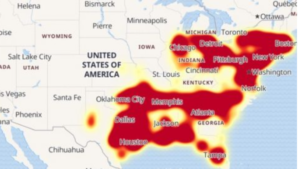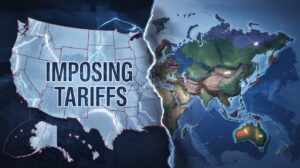U.S. Stock Markets React to New Tariffs: Dow and S&P 500 Experience Significant Drops
The U.S. stock market tumbled sharply as investors reacted to the latest round of tariffs imposed by the government. The Dow Jones Industrial Average plunged 1.3%, while the S&P 500 dropped 4.6%, marking its worst quarter since 2022. Technology stocks took a significant hit, with Tesla sliding 36% and Nvidia losing nearly 20%. The Nasdaq Composite also recorded a 10.5% decline in the first quarter of 2025.
Market Reactions and Investor Concerns
How Did the Stock Market React to the New Tariffs?
The latest tariffs introduced by the U.S. government have caused a ripple effect across financial markets. Investors fear these trade restrictions will drive up costs for businesses, leading to potential layoffs, reduced consumer spending, and a slower economy. As a result, major stock indices faced sharp declines, with investors pulling out of riskier assets.
Investor Confidence Drops Amid Economic Uncertainty
Investor confidence plays a key role in stock market performance. With fears of a potential global trade war, many traders and institutions are taking a cautious approach. Analysts predict that continued tariff increases could lead to further stock sell-offs, reduced investments, and a long-term slowdown in economic growth.
Stock Market Decline Summary (Q1 2025)
| Index | Percentage Decline |
|---|---|
| Dow Jones | -1.3% |
| S&P 500 | -4.6% |
| Nasdaq Composite | -10.5% |
| Tesla | -36% |
| Nvidia | -20% |
Impact on Key Sectors
Which Industries Are Affected the Most?
The new tariffs are not just affecting Wall Street; they have direct consequences for several industries that rely on imports and global supply chains.
Industries Facing the Biggest Impact
- Technology – Higher component costs are impacting companies like Apple, Microsoft, and Amazon, leading to stock declines.
- Retail & Consumer Goods – Tariffs on imported goods will lead to higher prices for consumers, reducing spending and affecting companies like Walmart and Target.
- Automotive – Car manufacturers, including Ford and General Motors, will face increased production costs due to tariffs on steel and aluminum.
- Financial Markets – Investors are moving funds away from stocks into safer assets like bonds and gold, reducing market liquidity.
How Tariffs Affect the Economy
What Are the Economic Consequences of Tariffs?
Tariffs have both short-term and long-term economic effects. The immediate impact includes rising costs for businesses that rely on imported materials, which often results in higher prices for consumers. Over time, if businesses struggle with higher costs, they may cut jobs, leading to weaker economic growth.
Tariffs and Their Economic Impact
Tariffs
│
┌───────┴────────┐
│ │
Increased Costs Retaliation from Other Countries
│ │
▼ ▼
Higher Prices Reduced Exports
│ │
▼ ▼
Lower Consumer Job Losses in Affected Industries
Spending
│
▼
Slower Economic GrowthConsumer Confidence Drops
A strong consumer market drives economic growth. However, consumer confidence in the U.S. has declined for four consecutive months, reaching its lowest level since 2021. This decline indicates that Americans are less willing to spend money due to uncertainty about the economy and rising prices.
The Global Ripple Effect
How Will Other Countries Respond to U.S. Tariffs?
International trade partners may impose retaliatory tariffs, leading to disruptions in global supply chains. This could impact industries such as agriculture, technology, and manufacturing, where U.S. companies rely heavily on international sales.
Potential Consequences of Global Trade Wars
- Increased Trade Barriers – Countries may impose higher tariffs on U.S. goods, making American exports more expensive.
- Supply Chain Disruptions – Businesses that depend on global suppliers may face shortages and increased production costs.
- Global Economic Slowdown – A prolonged trade war could lead to a decrease in international trade and overall economic stagnation.
What Should Investors Do in Response to Market Volatility?
Financial experts advise that investors take a long-term approach and avoid panic selling. Diversification remains key—investors should consider holding a mix of stocks, bonds, and commodities to balance risk during volatile periods.
Conclusion: What’s Next for the Market?
The stock market’s reaction to the latest tariffs underscores the fragility of the current economic landscape. With consumer confidence falling, job market concerns rising, and inflation pressures mounting, investors and businesses alike will need to navigate an increasingly uncertain economic environment. The coming months will be critical in determining whether the U.S. can avoid a full-scale recession or if further economic turbulence lies ahead.
[USnewsSphere.com / mw]





